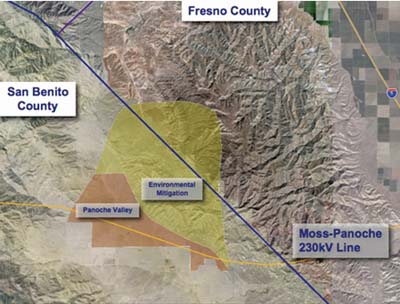Sometimes Duke Energy Renewables prefers owning its projects outright. Sometimes it prefers a partner.
This renewable energy arm of the largest public utility in the nation was certain how it wanted to approach involvement in the newly named Panoche Valley Solar Project. Considering the complexity of building major projects in California – and prior ownership’s already established ties in the community – the choice was clear with the San Benito County venture.
Duke Energy Renewables wanted a partner, “more of a 50-50 feel,” said F. Reed Wills, vice president of development.
“We particularly did not want to acquire the business,” Wills said while visiting Hollister last week with other officials from Duke Energy Renewables. “We wanted to have a partner here in this community.”
From the perspective of PV2 Energy, the firm now partnering with Duke Energy Renewables on the 399-megawatt solar farm in Panoche, the merger answered any questions about credibility going forward.
PV2’s Eric Cherniss underscored that some locals had expressed uncertainty over who might actually be the project owner 15 or 20 years down the road. The solar farm proposal in 2009 initially came from Solargen Energy, an upstart with little experience in solar or the necessary financial clout to get such a massive project off the ground.
“Before, that question, when it was Solargen, was harder to answer,” Cherniss said. “Now that you have Duke involved, it’s a lot easier to understand how that’s going to be managed.”
Added Wills, regarding its continued prospects for such interests: “We can’t have a business doing other projects if we turn tail and run.”
Duke’s presence caps, for now, an evolution that started in 2009 with a proposal for a 1,000-megawatt solar farm costing as much as $4 billion – figures since reduced to 499 megawatts and a continually decreasing price tag due to a downward cost trend in the panel market.
Duke executives underscored their attraction to the Panoche partnership because PV2 – a product of a re-formed company after dissolving Solargen – already had so much leg work out of the way. The firms had crossed hurdles such as tense debate during many county hearings, leading to the fall 2010 approval of the environmental review – which spurred lawsuit from the opposition and an eventual court victory for the solar company.
As the project stands, it will include more than 22,000 acres for mitigation, permanent conservation easements with prime wildlife habitat. The project itself will encompass about 2,500 acres for construction.
Duke executives underscored the cooperative nature of the partnership. The North Carolina-based company, which multitudes of experience and more than 50 renewable energy projects under its belt, can help with such areas as permitting, transmission and finances, along with its brand strength.
Wills emphasized the importance, moving forward, of gaining continued community support – which they believe they have garnered from the business community and elected officials to this point. He also encouraged letters and other feedback from the public.
“The more informed people are, the more excited they’re going to be,” he said. “Community support will get the governor’s office behind it and make the utilities feel comfortable.”
While Duke Energy Renewables has moved toward investing more in solar, it has focused largely on wind power in its early years, after its launch in 2007. The Panoche Valley project represents its most significant project yet in California. Wills said Duke shoots for a variety when it comes to project size, but the large scale of the local endeavor was particularly attractive this time around.
Solar is especially interesting to Duke because the cost trajectory continues downward.
“The potential of it is so enormous that we feel a responsibility to our customers, both regulated and non-regulated, we’ve got to be in this market.”
The potential for San Benito County, meanwhile, could result in hundreds of construction jobs and some permanent jobs after the build-out, right now primarily expected from 2014 to 2016.
Duke Energy Renewables corporate spokesman Gregory G. Efthimiou said the company will stress, with its engineering procurement manager, hiring local businesses.
“We will encourage them to explore every possible opportunity to hire locally,” he said.










